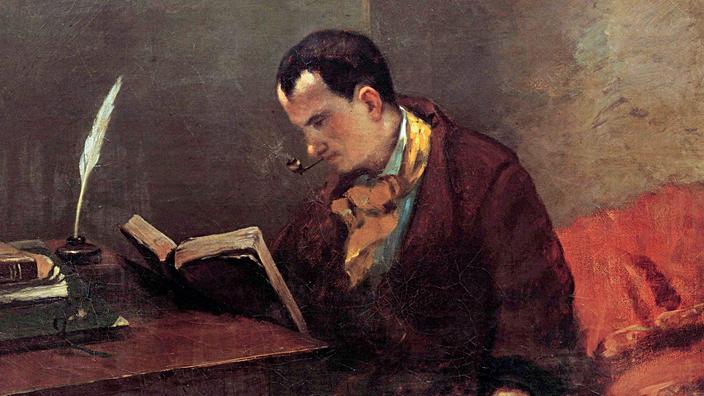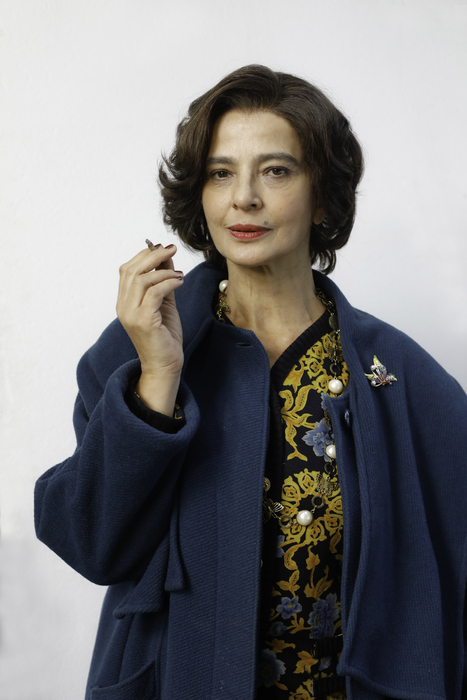Since his majority, Baudelaire has inherited the fortune left by his father.
Finally free to live as he pleases, he began by settling on Île Saint-Louis, then rue Vaneau, before returning to Quai d'Anjou and ending up renting an apartment on the third floor of the Pimodan hotel.
He lines the main room with a precious red and black glossy paper to give refined dinners served by a servant.
He constantly changes furniture, buys paintings, engravings, books which he has sumptuously bound, and ruins himself in shirts, gloves, suits, mostly black, which he adorns with scarves.
Made of silk.
To read also Michel De Jaeghere: "Baudelaire, the alchemist of the pain"
His spending madness knows no bounds. The debts accumulate especially with the owner of the Pimodan hotel and the second-hand dealer who keeps a shop there. His mistress, Jeanne Duval, who plays the utilities at the Théâtre de la Porte-Saint-Antoine when she's not tapping, also costs him a lot of money because he has installed her not far from his home. Jeanne is cheating on him. He is enraged, but continues this feverish affair with his mulatto who inspires him many verses and which displeases his family so much.
Carefree of the next day, he leads the bohemian life of young Parisian literati who meet in cafes, taverns, cabarets to hold endless discussions, read their prose or sonnets, drink white wine, play billiards, smoke cigars and slander the direction of the journals in which they collaborate. Occasionally.
When Baudelaire, taken by the throat, mortgages four lots in Neuilly for the second time before selling them, the storm rises. Aware that his mother could place him under judicial advice, Charles takes the initiative and signs a power of attorney which establishes Caroline Aupick and the notary of Neuilly, Narcisse Ancelle, administrators of his property. He thinks he has avoided the danger, but very quickly he starts signing bills of exchange again. The family reunites. His brother Alphonse is not the least determined to put an end to this scandal.
On September 21, 1844, Narcisse Ancelle became his judicial council. He places what remains of his fortune in Charles, who will only receive 200 francs a month, a sum that the lawyer considers sufficient for a young bachelor. Fury, rage, by Charles Baudelaire. Against his brother, against General Aupick, especially against his mother. He always loved her. She just betrayed him. But he does not say a word to his friends about the disaster that strikes him. With them, he will continue to collaborate in satirical newspapers such as Le Corsaire, frequent theaters and exhibitions, publish poems anonymously or under pseudonym, as well as a few jokes. But when his friends Le Vavasseur and Prarond urge him to participate in a collective work, Baudelaire shies away. No doubt because he is already pondering a personal edition of his verses.He never stops chiseling, polishing, sculpting them.
He also
cared about
the project of writing a drama,
Idoleus
, and an essay on Spanish painters.
Almost every day, Baudelaire goes to the Louvre to contemplate Flemish, Italian and French paintings, but above all the brand new gallery of Iberian artists.
Murillo, Zurbarán, Ribera fascinate him with their "
bizarre ferocity
", El Greco and Goya transport him.
Because the "
cult of images
»Was his first passion (he inherited it from his father), he decided to report on the Salon of 1845. Baudelaire's text appeared on May 10.
He shows himself sharp, rigorous, celebrating Delacroix and grueling with ferocity Horace Vernet.
Despite flattering articles in the press, his brochure sold poorly.
Charles is affected.
Everything suddenly weighs on him.
The weary one.
Despairs him.
On June 30, 1845, he sent a letter to his judicial council - “
I kill myself - without sorrow. (…) I kill myself because I can no longer live
”- before stabbing
myself
in the chest. The wound is hardly deep. He was cared for by Jeanne, then continued his convalescence at the Aupicks' home. Fatally, his father-in-law intends to impose his “
rule
” on him and ask him to resume his studies. Baudelaire enrolled in the Ecole des Chartes, but did not attend it any more than in the past at the Faculty of Law. Between two quarrels with the general, he ends up leaving the Place Vendôme leaving a letter to his mother in which he says that he now accepts the idea of "
living hard
".
Cover of Figaro Hors-Série Baudelaire Étienne Carjat, 1861, paris BNF
On Figaro Store, Le Figaro Hors-Série Baudelaire, the spleen of modernity, € 12.90


/cloudfront-eu-central-1.images.arcpublishing.com/prisa/ZCAHDMB6WVDBPDWJ4ZUKGUMH4Y.jpg)









/cloudfront-eu-central-1.images.arcpublishing.com/prisa/S7ERVSCT4FUVX6R7TUVBDNTH5Y.jpg)


